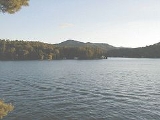
Lake Rabun
Encyclopedia
Lake Rabun is a twisty 835 acres (3.4 km²) reservoir
with 25 miles (40 km) of shoreline located in the Northeastern corner of Georgia
in Rabun County
. It is the third lake in a six-lake series that follows the original course of the Tallulah River
. The series begins with Lake Burton
as the northernmost lake, followed by Lake Seed
, Lake Rabun, Lake Tallulah Falls, Lake Tugalo
, and Lake Yonah
. Lake Rabun was built in a deep valley located along a 10 miles (16 km) section of the Tallulah River
.
The lakes are owned and operated by the Georgia Power Company
to generate hydroelectric energy for Georgia's largest city, Atlanta. At one time these lakes were the largest producers of electricity in the state of Georgia. Now, they only provide peak power supply.

Reservoir
A reservoir , artificial lake or dam is used to store water.Reservoirs may be created in river valleys by the construction of a dam or may be built by excavation in the ground or by conventional construction techniques such as brickwork or cast concrete.The term reservoir may also be used to...
with 25 miles (40 km) of shoreline located in the Northeastern corner of Georgia
Georgia (U.S. state)
Georgia is a state located in the southeastern United States. It was established in 1732, the last of the original Thirteen Colonies. The state is named after King George II of Great Britain. Georgia was the fourth state to ratify the United States Constitution, on January 2, 1788...
in Rabun County
Rabun County, Georgia
Rabun County is a county located in the U.S. state of Georgia. As of the 2000 census, the population was 15,050. The 2007 Census Estimate shows a population of 16,519...
. It is the third lake in a six-lake series that follows the original course of the Tallulah River
Tallulah River
The Tallulah River is a river in Georgia and North Carolina. It begins in Clay County, North Carolina, near Standing Indian Mountain in the Southern Nantahala Wilderness and flows south into Georgia, crossing the state line into Towns County. The river then travels through Rabun County and ends in...
. The series begins with Lake Burton
Lake Burton (Georgia)
Lake Burton is a 2,775 acre reservoir with 62 miles of shoreline located in the northeastern corner of Georgia in Rabun County. It is the first lake in a six-lake series called the Tallulah River Watershed that follows the original course of the Tallulah River...
as the northernmost lake, followed by Lake Seed
Lake Seed
Lake Seed is a 240 acre reservoir with 13 miles of shoreline located in Rabun County, in the northeastern corner of Georgia, USA. It is the second lake in a series of six lakes that follow the original riverbed of the Tallulah River. Each lake in the chain is created by hydroelectric dams...
, Lake Rabun, Lake Tallulah Falls, Lake Tugalo
Lake Tugalo
Lake Tugalo is a reservoir with of shoreline located in the northeastern Georgia in Habersham and Rabun counties, but also lies partially in Oconee County, South Carolina. It is the fifth lake in a six-lake series created by hydroelectric dams operated by Georgia Power that follows the original...
, and Lake Yonah
Lake Yonah
Lake Yonah is a lake on the Tugaloo River, separating Georgia and South Carolina. The lake is created by the Yonah Dam, which is owned by Georgia Power. Lake Yonah is a residential lake with about seventy-two vacation and permanent homes...
. Lake Rabun was built in a deep valley located along a 10 miles (16 km) section of the Tallulah River
Tallulah River
The Tallulah River is a river in Georgia and North Carolina. It begins in Clay County, North Carolina, near Standing Indian Mountain in the Southern Nantahala Wilderness and flows south into Georgia, crossing the state line into Towns County. The river then travels through Rabun County and ends in...
.
The lakes are owned and operated by the Georgia Power Company
Georgia Power
Georgia Power is an electric utility headquartered in Atlanta, Georgia, United States. It is the largest of the four electric utilities that are owned and operated by Southern Company....
to generate hydroelectric energy for Georgia's largest city, Atlanta. At one time these lakes were the largest producers of electricity in the state of Georgia. Now, they only provide peak power supply.
History
Lake Rabun began filling in May 1915 with the completion of the Mathis Dam to form a reservoir of over ten million gallons covering 834 acres (3.4 km²) with a normal water level of 1690 feet (515 m) above mean sea level. The property was purchased by the Georgia Railway and Power Company (later renamed Georgia Power Company). The Mathis Dam is an ambursen-type concrete dam with a height of 108 feet (33 m) and a span of 660 feet (201 m). The Terrora Hydroelectric Plant at Mathis Dam has a generation capacity of 16,000 kilowatts. The reservoir elevation is listed as 1,683 feet on topographic maps, but Georgia Power considers the lake full at an elevation of 1689.6 feet (515 m).4th of July Traditions
Lake Rabun has a rich and unique Fourth of July celebration that is sponsored and coordinated by the Lake Rabun Association (LRA). Each year there is a wooden boat parade that follows the shore lines of the lake. Prizes are given to the most decorated boat and boat house. In the evening a spectacular fireworks display is given directly on the lake. Spectators watch the display from hundreds of boats crowded along the lower basin of the lake.

